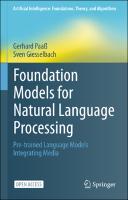Foundation Models for Natural Language Processing
Pre-trained Language Models Integrating Media
Author(s)
Paaß, Gerhard
Giesselbach, Sven
Language
EnglishAbstract
This open access book provides a comprehensive overview of the state of the art in research and applications of Foundation Models and is intended for readers familiar with basic Natural Language Processing (NLP) concepts. Over the recent years, a revolutionary new paradigm has been developed for training models for NLP. These models are first pre-trained on large collections of text documents to acquire general syntactic knowledge and semantic information. Then, they are fine-tuned for specific tasks, which they can often solve with superhuman accuracy. When the models are large enough, they can be instructed by prompts to solve new tasks without any fine-tuning. Moreover, they can be applied to a wide range of different media and problem domains, ranging from image and video processing to robot control learning. Because they provide a blueprint for solving many tasks in artificial intelligence, they have been called Foundation Models. After a brief introduction to basic NLP models the main pre-trained language models BERT, GPT and sequence-to-sequence transformer are described, as well as the concepts of self-attention and context-sensitive embedding. Then, different approaches to improving these models are discussed, such as expanding the pre-training criteria, increasing the length of input texts, or including extra knowledge. An overview of the best-performing models for about twenty application areas is then presented, e.g., question answering, translation, story generation, dialog systems, generating images from text, etc. For each application area, the strengths and weaknesses of current models are discussed, and an outlook on further developments is given. In addition, links are provided to freely available program code. A concluding chapter summarizes the economic opportunities, mitigation of risks, and potential developments of AI.
Keywords
Pre-trained Language Models; Deep Learning; Natural Language Processing; Transformer Models; BERT; GPT; Attention Models; Natural Language Understanding; Multilingual Models; Natural Language Generation; Chatbot; Foundation Models; Information Extraction; Text GenerationDOI
10.1007/978-3-031-23190-2ISBN
9783031231902, 9783031231896, 9783031231902Publisher
Springer NaturePublisher website
https://www.springernature.com/gp/products/booksPublication date and place
Cham, 2023Imprint
Springer International PublishingSeries
Artificial Intelligence: Foundations, Theory, and Algorithms,Classification
Natural language and machine translation
Computational and corpus linguistics
Artificial intelligence
Expert systems / knowledge-based systems
Machine learning


 Download
Download Web Shop
Web Shop